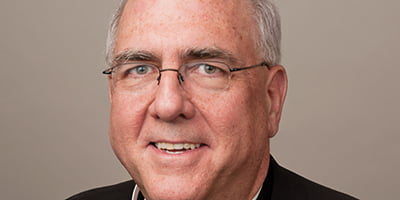
by Archbishop Joseph F. Naumann
Recently, I read a book entitled “Advent of the Heart,” a collection of seasonal sermons and prison writings of Father Alfred Delp, SJ. Father Delp was born on the feast of Our Lady of Sorrows (Sept. 15), 1907, in Mannheim, Germany.
In the mid-1930s, Father Delp gave a series of sermons against the “German Faith Movement,” a neo-Teutonic, anti-Christian sect. It was the “German Faith Movement” that articulated the philosophical foundation for Nazism.
Father Delp became part of the German Resistance, assisting Jews escape the Nazi reign of terror. Father Delp was arrested on July 28, 1944, for his involvement with a group that was preparing for the moral, cultural and spiritual future of Germany after the anticipated defeat of Hitler. He was subjected to several weeks of torture and interrogation.
During December 1944, with handcuffed hands, Father Delp wrote a series of Advent meditations on slips of paper that were smuggled out of the prison by the women who did his laundry. In January 1945 he was convicted of high treason and sentenced to death for his opposition to Nazism. Father Delp was executed on the feast of the Presentation (Feb. 2) in 1945.
In 1933, Father Delp wrote a play, entitled “The Eternal Advent,” that was performed by the students at a Jesuit boarding school where he served as prefect. He had always been fascinated by the themes of the Advent season.
From his prison cell in 1944, Father Delp reflected on the theme of joy found in the liturgy for the Third Sunday of Advent, Gaudete Sunday: “The conditions for true joy have nothing to do with the conditions of our exterior life, but consist of man’s interior frame of mind and competence, which makes it possible now and again for him to sense, even in adverse circumstances, what life is basically about.”
Father Delp understood Advent of the heart as something much more than preparing ourselves to celebrate the Christmas holiday. He saw it as a spiritual program that could become a way of life in which we open our hearts more and more to encounter the living God. Father Delp viewed Advent as an annual opportunity to become more in touch with the source of “true joy.”
Before the recent revision of the Lectionary with its three-year cycle of readings, Lk 21: 25-33 was the Gospel used every year for the First Sunday of Advent. In this passage, Jesus instructed the disciples regarding some of the signs that will occur before his Second Coming: “There will be signs in the sun, the moon, and the stars, and on earth nations will be in dismay, perplexed by the roaring of the sea and the waves. People will die of fright in anticipation of what is coming upon the world, for the powers of the heavens will be shaken” (Lk 21: 25-26).
In the introduction to Father Delp’s writings, it is noted how he was able to connect the experience of Germans during World War II with the biblical themes of Advent: “As homes in his parish were shaken by falling bombs, as families were shaken by the news of loved ones killed or missing or imprisoned, as an immoral government shook the very foundations of established moral values and human rights, the word ‛shaking’ appeared in Delp’s preaching and writing, used as a summons to conversion.”
Though it maybe easier for us to shield ourselves from the instability of the world around us than those who endured the trauma of World War II, still there are plenty of signals of the shakiness of pinning our hopes on anything but the faithful and enduring love of God revealed in his Son, Jesus. The threat of terrorism, the tragedy of war, the fragility of our economy, the corroding of society and the weakening of family life by the abandonment of moral truths are all tremors revealing the quaking that threatens lives built on the things of this world.
During the weeks of Advent, I will consider some of the same Advent themes that Father Delp preached and wrote about in wartime Germany. I hope each one of us will take advantage of this season, allowing it to shake us from the delusion that we can find joy, peace and hope apart from God. I pray that we will resist the strong cultural pull to allow ourselves to get caught up with activities of the secular observance of Christmas, thus missing the opportunity for these days to bring about a special encounter with God.
It is only by placing God in the center of our lives that we discover our true humanity and we find the ability to experience peace and joy, no matter the exterior circumstances of our lives. I pray that we will use these weeks to strengthen and deepen our relationship with Jesus. I desire for every member of the archdiocese to develop a faith like that possessed by Father Delp — a faith that has the capacity to allow us to experience peace and joy even in a prison cell awaiting execution.
May we all experience this year an Advent of the heart!


